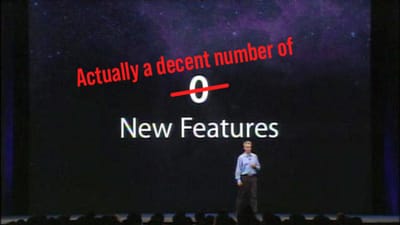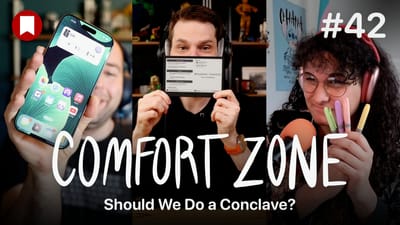Windows Ruined How People Use Smartphones Today
How many people do you know in your life who have an iPhone, and religiously "close" their apps every single time they use their phone? I know at least 3 people who do this, and it drives me crazy. What's almost more frustrating that the mere fact that they're doing this extra work, they are also the same people who complain the most about things being slow and their battery life needing to be better.
These people are my friends and family, so I can only say "it's because you're working against the system" so many times before dinner conversation gets a little tense, but I'm screaming inside every time I see them do it.
And what more can I do? I have asked them why they do it and tell them why it actually isn't something they need to do anymore. I've dropped links to articles about how you should not be closing your apps all the time in my social streams. I don't know what else I can do beyond jailbreaking their phones and disabling the double-tap action on their home buttons so they just can't do it anymore.
"I don't want them running in the background."
For years iOS didn't allow for any form of background activity for apps. The first version of Pandora, which was released for iPhone OS 2, would stop playing music if you went back to the home screen. It sucked, and was something that needed to be fixed, but Apple didn't have a good way to do it for a couple years.
They finally brought a feature they called "multitasking" to iOS in 2010 (iOS 4). This was a limited, but kind of brilliant feature in that it changed the fundamental way apps behaved on our computers when they were not in the foreground. Pandora, for example, would now be able to keep playing music while it was in the background, but all other functionality was cut off. And as soon as you stopped playing music, Pandora was back to doing nothing.
Multitasking has grown up since then and many more types of apps can perform limited functionality while they are in the background, but the system holds true to it's original intention of being so easy that the user never had to think about what apps are running an which ones are not. It was never Apple's intention to have users ever need to manage their open apps at all.
For those unaware of how multitasking works on iOS, here's a quick overview (Apple nerds can probably skip to the next few paragraphs).
When you have an app open and you can see it on screen, the app is doing all the things it is programmed to do. You're tapping and swiping and using the app to its fullest. When you hit the home button on your iPhone, the app shrinks back into its icon on your home screen, and displays in your app switcher along with all other apps you've used recently. At this point, the app does one of two things:
One, it wraps up any active tasks and saves any documents that were being edited when you closed the app. It has a few seconds to wrap up these tasks and then is put into a "frozen" state.
Two, the app has some specific function you told the app to do in the background. There are some tasks, such as media playback (Pandora, Spotify, etc) and navigation (Google Maps) that can keep working in the background. You'll be able to tell an app is doing this because you'll either know that your audio is still playing or you'll see a banner across your menu bar like this:
Everyone seems to understand the second option listed above, but there is a lot of confusion on the first one. When you hit the home button and you didn't explicitly tell that app to keep doing something, it's stopped. It's not "running in the background" like so many people tell me they think it is, it's just been frozen in the state you left it (in memory) and will open in an instant if you go back to it before the system wipes it from memory for another app. It's not still using your CPU or running any code constantly while it's in the background. The app's status is essentially saved to the iPhone's RAM so it can open quickly the next time you open it and you pick up right where you left off.
I can already hear you app closing folks telling me "but storing the app in memory is killing my battery life!" No it isn't.
Memory on a computer is meant to be used. Your iPhone has 1-2GB of RAM in it, and it's battery life does not get better or worse depending on how much of it is "in use" at a particular moment.
Think of memory like dresser drawers. You can keep a bunch of clothes in your drawers all the time and they're easy to find, are organized, and you have plenty of room in your bedroom because all your clothes fit nicely into the dresser. But you also have the option of not using your dresser at all and instead putting all your clothes in their original packaging in another part of your home. You feel good about this because your dresser is empty, but it's not doing anything to help you have more space in your bedroom. It's certainly not doing anything to help you access your favorite shirt faster.
It's not a perfect metaphor, but think of the dresser as the memory on your phone, the clothes as your apps, and your bedroom as you phone's battery life. Just like your bedroom as the same amount of free space whether your dresser drawers are full or empty, your iPhone's performance/battery life is exactly the same whether you have your apps in the task switcher or if you close them all out. And when you run out of memory, sorry, drawer space, your dresser doesn't explode, you just look for the item you wore the longest ago and swap it out for the new hotness. Your phone is smart enough to do the exact same thing. When you launch an app if it's out of memory, it will wipe the least-recently used app out of memory to make room for this new one. And because its a computer, it takes a fraction of a millisecond to do that. You won't even notice.
And again, just like it's going to be a longer process to find your shirt in it's original packaging, unwrap it1, and then put it on, your iPhone is going to take longer to open an app that is not in memory anymore than one that is. So not only are your not improving your battery life, you're actually making your phone feel slower because you're making it do more work.
I said at the top that I think we have Windows to blame for this mentality, and I definitely think that is a contributing factor to all these people who are now closing their apps. Windows in the 90s and 00s trained us to understand that lots of running apps were bad and responsible computer users managed their apps. The reason made sense back then; if an app was running, it was doing whatever it wanted, so you had to close it to keep it in check. Mac OS was not immune to this either, and you had to manage your apps on the Mac as well, but Mac OS always managed this a little better than PCs at the time. Even today, Mac OS (soon to be macOS) will put apps into a similarly "frozen" state when they are in the background and not being used as well.
Modern operating systems like iOS and Android have made this behavior obsolete. It's archaic for operating systems to make you manage your own memory and CPU usage, but people have bad memories of needing to do it years ago. If you are one of those people, I urge you to try and go cold turkey with closing your apps and see how things go. I personally never close my apps and I'm the guy who people say "well everything works fine for Matt." Maybe there's a reason for that…
- Just go with me here that shirts are sold in plastic. ↩


